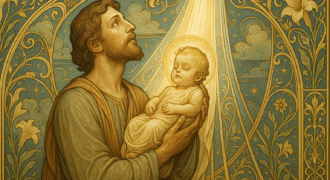The Great I AM
Pity is to feel sorry for the misfortune of another.
If in Christ we have hope in this life only, we are of all people most to be pitied.
According to Paul, it is a sorrow and a misfortune to believe in Christ without any hope for a life after death. In fact, he calls it the biggest misfortune by calling such men ‘most to be pitied’. It is a pitiable estate for any man, whether he be an atheist, an agnostic, or even a religious person who has no hope of a resurrection, but ‘most’ pitiable for the Christians who having come so close to the actual thing, have the misfortune of missing it entirely.
So many pilgrims who come to Christ, desire a partial Christian life, whether it be, as we see in this case, a disbelief of the resurrection, or in other cases, a disbelief in God’s sovereignty, or his purposes to cause all things to work together for our good, and so on. If one receives Christ without a belief in the resurrection, he is most to be pitied. But if we come further down the ladder, all disbelief of Christian doctrine is a pity of some measure or another.
You may have heard it preached that if you give your life to Jesus, you can’t give him part of your life, for he requires of you the whole of it. And what we’re talking about here is simply another way of saying the same thing. If you come to Christ, you have to come for ‘all of Christ’. A lot of people confess with their lips that they have given their everything to Jesus, but then live out those lives making excuses saying, “Jesus understands”. However, if you come to Christ, his word, for all of Christ, then you have to deal with all of God from all over the Bible. This isn’t a loose promise of ‘Lord I give you my everything’, but a compelling and intentional way of life where you pursue a clear understanding of who the Lord is, and what he requires of you, every day.
There is a growing number of professing Christians today who see Christianity as a useful religion because of its valuable principles. The ethics and moral values they say are more important than the many supernatural “myths” that are better avoided. And of all these so-called myths, the most preposterous is the ‘resurrection’ of the dead. Yet, according to Paul, the greatest of these absurdities is among the central realities of the Christian hope. Men who look at the Bible as a mere moral compass are most to be pitied.
Now, having laid that groundwork, it is time we asked the questions, “What exactly makes the resurrection such an important teaching for the Christian?”
God's Not Dead
We serve a Living God, not the memory of a dead God. This is Paul’s main defence of the doctrine of resurrection.
Now if Christ is proclaimed as raised from the dead, how can some of you say that there is no resurrection of the dead?
But if there is no resurrection of the dead, then not even Christ has been raised.
And if Christ has not been raised, then our preaching is in vain and your faith is in vain.
We are even found to be misrepresenting God, because we testified about God that he raised Christ, whom he did not raise if it is true that the dead are not raised.
If life after death is a myth, then Christ no longer lives. That would mean that death defeated Christ once and for all. Why would the eternal and benevolent One put aside the glories of heaven to come and die along with a people destined for death?
There is no salvation without the resurrection. Doug Wilson often clarifies that Jesus did not die that we might live. Jesus died that we might die to our sin once and for all. But we have life because Jesus rose from the dead. To say otherwise, is to misrepresent God.
The Bible is not a buffet where you cherry pick your moral values, it is the word of God in which he discloses himself to us in order that we may have faith, faith in the resurrection.
Therefore, to say ‘He is risen’ is to say that we have hope that he will raise us too. And to say that there is no resurrection is to say that Jesus is dead.

We are justified by the resurrection
Not only is our faith futile (useless) but we live in our sins. According to Paul, if Jesus died and did not rise, then he suffered the fate of mankind along with mankind and nothing’s changed.
but for ours also. It will be counted to us who believe in him who raised from the dead Jesus our Lord,
who was delivered up for our trespasses and raised for our justification.
He was raised for our justification. This is not to say that Jesus’ death had no role to play in our justification. It had every role, but the death of Christ is ultimately meaningless without his resurrection.
According to verses such as Acts 17:31, there is a vindication of Christ that the Father achieved by raising him from the dead. The resurrection of Christ is God’s statement of approval that Jesus is who he said he is, the son of God. Therefore, without a resurrected Christ, we are not justified before God because our justifier is not shown to be vindicated before God either.
The resurrection is not an additional achievement to the work of Christ, it is an elemental transaction that happened, the climactic conclusion to the redemptive work that sealed our justification. Not only did he take our sins upon the cross, but he absolved our guilt in his resurrection. We are redeemed because Jesus defeated death.
For he must reign until he has put all his enemies under his feet.
The last enemy to be destroyed is death.
Death is Christ’s enemy, not ally.
I hope you see the centrality of the resurrection in the Christian belief. So now, let us turn our attention to the first fruit of resurrection, Christ our Lord.
The Great I AM
When Moses asks God the sublime question – what is your name, the Lord responds in Exodus 3:14
God said to Moses, “I am who I am.” And he said, “Say this to the people of Israel: ‘I am has sent me to you.’ ”
We call this attribute of God’s self-existence, aseity. God does not exist because of anything apart from himself. He is forever the uncaused Cause, the uncreated Creator. He wasn’t just there at the beginning of all things, He was the beginning of all things including time.
Brothers and sisters, if you have an ambiguous image of the God whom you worship, then do away with such ambiguity by looking to the word of God. Ponder and meditate on the fact that the name most apt for our God is ‘I AM’. It is the ultimate statement or name of self-identification. He exists not because of anything, and everything else exists because of Him.
Now, John the Apostle, in his Gospel narrative, emphasises what we refer to as the seven ‘I AM’ statements of Christ. You may have guesses now where I’m going with this.
1. I AM the bread of life
Jesus said to them, “I am the bread of life; whoever comes to me shall not hunger, and whoever believes in me shall never thirst.
I am the living bread that came down from heaven. If anyone eats of this bread, he will live forever. And the bread that I will give for the life of the world is my flesh.”
Jesus here offers us an imperishable food, a bread that does not stale or rot, for it is living. And this living bread gives unending life to the one who eats it. Not only that, but He himself is that imperishable bread.
Is it not interesting that this metaphor of a living bread that does not depend on preservatives or external aid, has a certain aseity to it? Such a bread that removes all hunger and thirst for all time can only be found in the essence of the eternal I AM.
However, for many of us, the question remains, “How does one eat this bread of life?”
Well, we eat our daily fill of the food of this world in order to sustain our physical bodies. We follow diet plans to ensure a more healthy life. We measure the kind of food we have, and how often we eat from outside. In fact, for a lot of us, a lot of life revolves around what we eat. In much the same way, this metaphor of the bread of life shows us that we are to depend on Christ for the sustenance of our lives. This is reflected in the hours you spend in prayer, learning God’s word, and in fellowship with the saints.
Can you think of some practical ways in which this can be a reality in your life, that you depend on the great I Am willingly?
2. I AM the light of the world
Again Jesus spoke to them, saying, “I am the light of the world. Whoever follows me will not walk in darkness, but will have the light of life.”
Unlike the fragility of the candles we light in the dark, we have here a light that does not fade. This light is certain at all times in all darkness. It is therefore called the light of life, not the light of the morning or the light of the evening. It is the light of all life.
And Jesus is that light.
Again, this light unlike any other light, was not lit at a certain point in time. It does not fade just as it was not made. The light of Christ is an eternal light that cannot be put out by any external source.
How does one use this light of life? Again, use the metaphor. You use the light of a candle to find your way around a dark room. In the same way, you let the light of Christ lead you in this dark world, a world where there are many false lights, and false twinkles of hope, you are called to stay with the only certain light you have – Christ. If you do not let the light of Christ lead your way, you will be lost.
Now, you might argue that all that is still metaphorical language. What is this light of Christ then?
It is the light that comes from all that Christ has to offer. It is the light that you receive when you receive him entirely. The same as the bread, you take ‘all of Christ’ from ‘all of Scripture’ and depend upon him for your sustenance. He is the bread of life. And you depend upon him for light in dark places for he is the light of life.
3. I AM the door
Jesus talks to the people about a shepherd, his sheep and thieves. In that analogy, Jesus says,
“Truly, truly, I say to you, he who does not enter the sheepfold by the door but climbs in by another way, that man is a thief and a robber.
That door to the sheep-pen is locked and shut, and only the shepherd has the keys to open and close it. The thief has no way of entry and are forced to jump the fence.
Then Jesus said,
So Jesus again said to them, “Truly, truly, I say to you, I am the door of the sheep.
All who came before me are thieves and robbers, but the sheep did not listen to them.
I am the door. If anyone enters by me, he will be saved and will go in and out and find pasture.
Jesus is the door of true safety. Those who come in through that door are not thieves but those who are saved. There are many worldly enticements hanging on barbed fences all around us, and there is none who does not regret having climbed out the fence with the thieves.
Little children often ask the question, “Couldn’t thieves just bring a car and run the door over? Or use an explosive?”. Well, the point of the passage is not simply that Jesus is the door, but that Jesus is the door [emphasis on Jesus]. This door will not budge to the enemies of your souls.
What does this metaphor mean? It means that none can force their way into the sheepfold of God. There is but one door of entry, and Jesus is that door. Only by receiving all of Christ can one have eternal life.
4. I AM the good shepherd
I am the good shepherd. The good shepherd lays down his life for the sheep.
I am the good shepherd. I know my own and my own know me,
Not only is Christ the door, but he is also the good shepherd that leads his flock. This good shepherd lays down his life for the sheep. It is a significant thing that Jesus should call himself the ‘good’ shepherd. When the rich young ruler called Jesus the good master, Jesus asked him, Luke 18:19
And Jesus said to him, “Why do you call me good? No one is good except God alone.
He did this to test the young ruler if he understood what he meant by calling Jesus the good master. If only God is good, and Jesus is good, then it must logically follow that Jesus has to be God. So if he is the good shepherd, he is not ‘good’ by human standards, he is good by eternal standards. He is the righteous shepherd. We as sheep are to look to our shepherd and trust him as good all the time. We are to have a trust in all of Christ, for all of time.
5. I AM the resurrection and the life
Jesus said to her, “I am the resurrection and the life. Whoever believes in me, though he die, yet shall he live,
This is why we believe in the resurrection. Because He is the resurrection and the life. To believe in Jesus is to have life, because to receive him is to receive life. The eternal life we possess is not a separate force interposed on us, but eternal life is having Jesus. Death is defeated for though we die, yet shall we live.
We are to set our hope of life after death upon all of Christ.
6. I AM the way, the truth, and the life
Jesus said to him, “I am the way, and the truth, and the life. No one comes to the Father except through me.
The use of the definitive article ‘the’ in front of way, truth and life is no grammatical accident. All of the way, the truth and life, is bound up in the person of Christ. He is not one among many ways, and many truths and many lives. He the way, the truth, and the life. To live our lives with this understanding is to search for Christ in everything we do. We do not seek our own path but turn to all of Christ revealed in his word. We do not believe our own truth but turn to all of Christ revealed in his word. This way, truth and life transcends all creation. It is the ultimate source of meaning and purpose.
Such a grand claim can be made only by the great I AM.
7. I AM the true vine
I am the vine; you are the branches. Whoever abides in me and I in him, he it is that bears much fruit, for apart from me you can do nothing.
All our pursuits in life have its life giving source in the vine, Jesus Christ. Can we trace all our activities and fruit bearing, to the vine? He is not just the vine, he is the true vine. True meaning original, one of a kind. This vine is the head of all and eternal. A vine divine, uncreated and eternal. Apart from him, we can do nothing. Is that a felt and known reality in our lives? We have to turn to ‘all of Christ’ for all that we do.
These are the seven I AM statements of Christ and in each you can see how they reflect the great name of the I AM in Exodus. These words of the incarnate Saviour are echoes of his own words he made before his incarnation from behind the fires of a burning bush. If God Is, then we have all that we have IN HIM.
Now, Jesus makes two more I AM statements in John that are not usually included among the seven because they don’t occur as metaphors. They are direct and explicit, but I believe they must be numbered here for us to understand Jesus’ intentions (or John’s intentions for recording these in his Gospel account) behind using the ‘I AM’ statements, and also to convince you that all this is not some fantasy of a fanatic preacher.
Jesus said to them, “Truly, truly, I say to you, before Abraham was, I am.”
There is no metaphor here. To the Jews who held Abraham in high regard, Jesus responded by saying, “before Abraham was, Ego Eimi’ – I AM. The same words used by the Greek Septuagint, which is the Greek translation of the Hebrew Old Testament that the Jews used during Jesus’ time. There is no question that Jesus here claims explicit union to God Almighty because when he makes this claim, the crowd picked up stones to kill him.
And the last one, John 18:4-5
Then Jesus, knowing all that would happen to him, came forward and said to them, “Whom do you seek?”
They answered him, “Jesus of Nazareth.” Jesus said to them, “I am he.” Judas, who betrayed him, was standing with them.
English translations ought to stop helping out contemporary readers so much. There is no ‘he’ in the original Greek, just ‘Ego Eimi’ – I AM.
And we read, John 18:6
When Jesus said to them, “I am he,” they drew back and fell to the ground.
The strangest thing happened when Jesus said this, or was it strange? Moses fell to the ground at the sight of the burning bush in his reverence of God, but these wicked and unrepentant men too fell to the ground at the this declaration of Christ. I do not believe like many charismatics claim that this is evidence of what they call the gift of ‘slaying in the Holy Spirit’. This here is Jesus, God Almighty, saying his name, and it shook the people off their feet.
This season, this year, in this celebration of Christ’s resurrection, I want to remind you church that are call to receive all of Christ for all of life.









